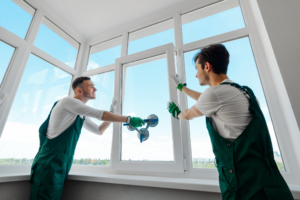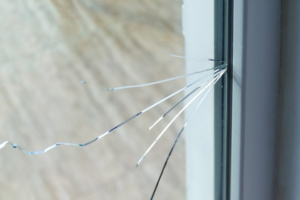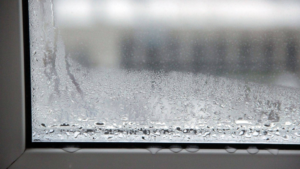When Should You Replace Your Windows?

Your windows play a big part in your home’s energy performance and comfort levels. If your windows are damaged or just outdated, they can’t do these things effectively. And when that happens, it’s time to replace them.
Your windows don’t suddenly become less energy-efficient, it happens slowly over months or years. So how do you know when they’re not as energy-efficient and need to be replaced?
We have 6 things to look out for if you suspect your windows are past their prime. If one or more of these sound familiar, it’s time to look into replacement windows.
Time to Replace:
Home windows have a lifespan of 15-20 years. Once they reach this age, the seals start to weaken or fail, which leaves you open to drafts and water seepage.
Moreover, single-pane windows were the standard 15+ years ago. These windows lack insulation and are not as energy efficient as modern double-pane windows.
#1: Your Windows Are Visibly Damaged
This is probably the most obvious sign you need to replace your windows. When a window is damaged, it’s more likely to break completely, which leaves your home open to more serious damage like water seepage, mold and mildew, and pests. It also makes your home easier for intruders to break into. Getting a damaged window fixed as soon as possible will keep your family safe and help you avoid more expensive repairs in the future.

#2: Your Windows Are Drafty
Drafts are a problem for a few reasons. First, it means that the air you’re paying to cool is seeping out and the hot, humid air outside is making its way in. A room with drafty windows will feel less comfortable than the rest of your home, and may even feel more humid.
Second, because outside air is seeping in, your HVAC system has to work harder to keep your home at the temperature you set.
To check for drafts, close your window, lock it, and hold your hand at the bottom or top of your window sash where it meets the frame. If you feel air coming in, you have a draft.
#3: Your Electric Bills Are Higher- With No Other Explanation
A lot of things can cause your electric bills to skyrocket, but if you’ve noticed that your electric bills have slowly crept up your windows might be to blame. Like we mentioned, drafts let the temperature-controlled air inside your house escape, which forces your HVAC system to work harder to try to keep your home at the temperature you’ve set. This drives your electric bills up and the increased workload can shorten the life of your HVAC unit. Replacing old windows with new, energy-efficient ones helps lower your monthly bills and makes sure your air conditioner doesn’t need to work harder than necessary.
#4: Condensation Forms On The Inside of Your Windows
Condensation on the inside of your window usually means your windows are leaking air and/or your home is humid. (Note: Condensation on the outside of your windows is not cause for concern. It just means that it’s warmer and more humid outside than it is inside.)
If you notice condensation between the panes of your double or triple-pane windows, it’s a sign that the air-tight seal has failed and the insulating gas has escaped. Whether it’s inside or between the panes, spotting condensation anywhere except the outside of your window is a definite sign they should be replaced.

#5: Carpet & Furniture Around Your Windows Are Faded
If the furniture, carpet, rugs, or decor that is exposed to the sunlight coming through your windows has faded, your windows probably aren’t don’t have the UV protection offered by modern windows with low-emissivity (low-E) glass. Low-E glass is treated with a microscopic film that keeps UV rays and solar heat from passing through. This prevents your furniture, carpet, and curtains from fading, and helps to keep your home cooler.
#6: Your Windows Don’t Damped Sound
If you live near a busy intersection, train tracks, or just have neighbors that like to get loud, you might think there’s nothing you can do about the noise. But there is! Modern double or triple-pane windows provide noticeable sound dampening, thanks to the additional insulation.
If any of these sound familiar, it’s time to trade your old windows in for new, energy-efficient ones!
